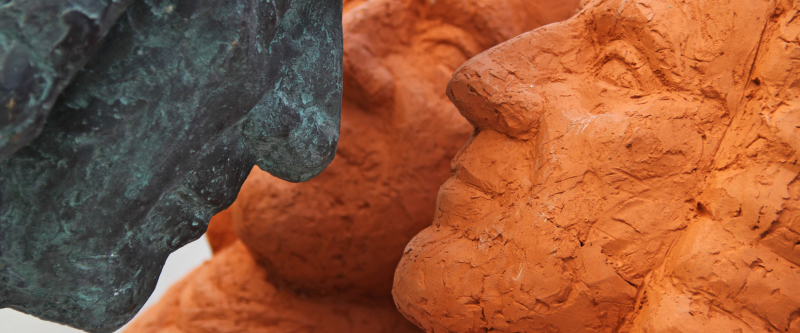
Biography of Telemann
Magdeburg, 1681-1694
Georg Philipp Telemann was born in Magdeburg on 14th March 1681. His father, Heinrich Telemann, was a preacher at the Heilig-Geist-Kirche. From 1691 Georg Philipp attended the Altstadt school and initially came into contact with music through the cantor Benedikt Christiani. It seems that this contact had lasting consequences, as Telemann's mother Maria was genuinely shocked by her son's strong musical tendencies, which had already become apparent at an early age. She had wished that he would later take up a “reputable” profession.
Clausthal-Zellerfeld, 1694-1701
To "deprive him of the poison of music" (as Telemann himself jokingly put it later), the 13-year-old Georg Philipp was sent to Clausthal-Zellerfeld in the Harz Mountains. For several years he lived there in the house of the clergyman Caspar Calvör and his wife, Catharina. But even here, his musical talent was quickly recognized and fostered: Telemann played the organ in St. Salvatoris Church, conducted the church choir, and composed! In 1697 Telemann became a grammar school pupil at the Andreanum in Hildesheim. With the support of the local rector Johann Christoph Losius, he further developed his musical skills and knowledge with, for example, visiting Braunschweig, where he attended musical performances of court music.
Leipzig, 1701-1704
Telemann enrolled to study law in Leipzig in 1701. However, he was unable to remain faithful to his resolution to no longer give priority to music for long. Together with other students, he founded a Collegium Musicum, a private society of music amateurs who regularly played music together. And it was in Leipzig that Telemann received his first commission to compose cantatas. His talent then finally took wing: As a singer, conductor, and composer, he made extensive contributions to the Leipzig Opera. Subsequently, he became organist and music director at the Neue Kirche in Leipzig. Telemann's further path was thus decided: He had become a "professional musician".
Sorau/Zary, 1705-1706
Erdmann Count Promnitz, a courtier of the Polish King (and Saxon Elector) August the Strong, summoned Telemann to Sorau. Here Telemann worked as court music director, conducting the court orchestra, composing and playing the organ. The Count had just returned from France and was fond of French music. It seems that he had numerous sheets of music in his luggage, thereby enabling Telemann to come into contact with compositions by Jean Baptiste Lully and André Campra, among others, and also develop an enthusiasm for France. Moreover, Telemann was deeply impressed by Polish folk music, which he discovered on journeys with the court orchestra through Poland, traveling to Cracow and Pless. He incorporated them into his compositions in a variety of ways.
Eisenach, 1707-1712
Political unrest prompted Telemann to leave Sorau in 1706. He turned to Eisenach, where he became concertmaster of the court orchestra in 1707 and shortly afterward its musical director. In this role, he had to compose concerts and overtures, works of homage, chamber music, and church music. In 1709 Telemann married Amalie Louise Juliane Eberlin. He had already fallen in love with the daughter of the Kassel Court Music Director Daniel Eberlin while in Sorau. The contact had come about because Amalie was the chambermaid of the wife of Count Promnitz. Amalie died in 1711 while giving birth to their first child. Shortly afterward, Telemann left Eisenach, but had been appointed "Kapellmeister von Haus aus." In other words: he continued to deliver compositions to the Eisenach court.
Frankfurt, 1712-1721
From 1712, the trade fair and coronation city of Frankfurt am Main offered Telemann attractive and versatile opportunities to put his skills to use. Initially, Telemann was employed by the city council as music director and Kapellmeister at the Barfüßerkirche (Church of the Discalced). Soon afterward, he took over the same function for the St. Catherine's Church. He also reactivated the Collegium Musicum of the Frauenstein Society, for which he also became an economic administrator and director of events. With the Collegium Musicum in Frankfurt, Telemann realized the performance of his Brockes Passion and the music in homage to the birth of Archduke Leopold of Austria date back to this period. Furthermore, he was able to establish connections with the then famous Darmstadt court orchestra. In Frankfurt, Telemann applied for citizenship, and in 1714 he married for a second time – the daughter of the Ratskornschreiber Andreas Textor, Maria Catharina Textor.
Hamburg, 1721-1767
When Telemann applied for a job in Hamburg in 1721, he hoped that it would significantly improve his career opportunities. These were provided, among other things, by the opera and by numerous representative events for council and citizens. Telemann also revitalized the Collegium Musicum in Hamburg and built up an active public musical life with it and with renowned singers. Another significant concern of Telemann was the modernization of church music based on contemporary lyrics. Despite initial struggles with adverse circumstances, Telemann, encouraged by his friends and sponsors, remained in Hamburg for the rest of his life.
